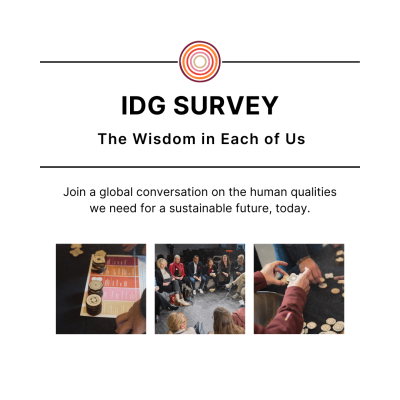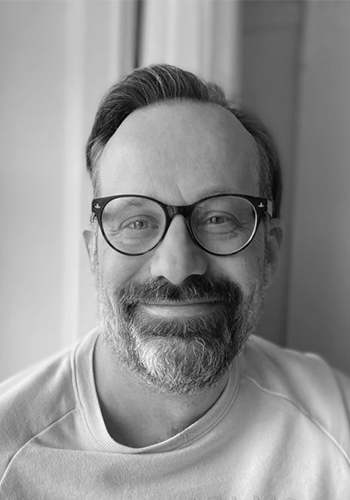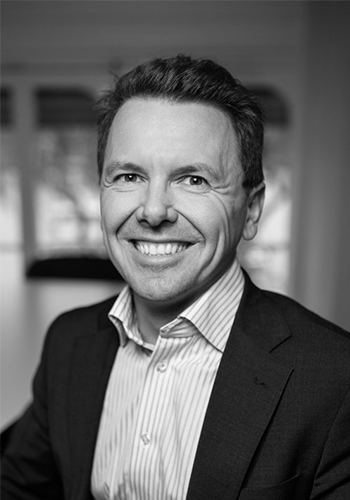IDG Survey 2024: Developing the IDG Framework
To ensure the framework’s global applicability, the IDG Survey opens up co-creation to more voices in a well-structured, inclusive and truly global dialogue that will shape the future of the IDG Framework.

How is it done?
In 2015, all members of the United Nations agreed on 17 goals to build a world of peace, dignity and prosperity on a healthy planet. The initiative ”Inner Development Goals” is convinced that understanding and building transformational skills is essential to achieve this global ambition, critical for developing a sustainable future for humanity and planet.
To understand these transformational skills across the globe, we invite participants to join a global conversation starting with giving their input into one of the most inclusive studies ever on this theme.
With your co-creation, we will achieve the vision of being a solid bridge between your knowledge and the impact of people’s inner and outer development to manage a better world. Better people, better planet.
This process will develop a Global IDG Framework, for the first time solidly based on input from all around the world. Answers will be analyzed and processed collaboratively by researchers in many countries across the world.
The global study is run as a distributed global collaborative process where country- and language based research team, established in as many countries as possible will collaborate.
Country teams will be coordinated by two co-leads who are able to work in the key languages of the participating countries and have at least earned a PhD in relevant areas. The teams will include up to ten co-researchers that represent a mix of the relevant cultural/language variations in the country.
The data for each country and language will be gathered anonymously through the same survey, administered through the Survey Monkey Platform (SMP) where possible and a special questionnaire where SMP is not feasible. In this case, SMP is ran from the Republic of Ireland within the European Union. No identifiable information about participants is collected without direct consent provided.
All teams will follow the same 4-phase process and ethical procedures (read more below). Active global coordination will happen through the team co-leads working with the core team led by the Head of Research Co-creation at IDGs. These meet regularly for support, learning and joint quality assurance throughout the four main phases
What are the co-creation phases?
Phase 1: Setting up the system (Mar → Sep 19, 2023)
During this phase co-creation have been conducted with more than 100 researchers and other experts across the globe to develop the survey and other methods. In parallel, information meetings have been conducted with so called multipliers (i.e international networks, global organizations, IDG Partner organizations & IDG Hubs) who are interested to help share the survey to a global audience. To get a comprehensive and inclusive dataset we aim at engaging at least 100 countries and many tens of thousands of responses worldwide. Researchers and multipliers have quality controlled the automatically generated translations of the survey.
Phase 2: Data collection (Sep 19 → Jan 2025)
Data collection starts with the global launch, September 19. Surveys and other methods to gather information, reviewed and revised as we learn more, will be open for gathering responses for 15 months. Reach into countries will be tracked regularly and fed back to researchers and multipliers to assure that data gathering becomes as broad and inclusive as possible. Multipliers will continually distribute the survey through social media, conferences, emails and other suitable distribution channels.Phase 3: Analysis & Prioritization (Jan → Jun 2025)
Each country research team focuses on the material relevant for their country in one or several relevant languages. We aim at having as many countries as possible from all continents to have at least 500 responses to get started with the data analytic process.The process includes 4 steps:
- Identify all relevant survey responses i.e. the individual and collective transformational skills (including qualities, abilities and skills) relevant to build a sustainable future for people and planet
- Add additional data from other sources relevant for the country.
- Use this pool of qualitative data and apply thematic analysis systematically to generate a list of transformational skills under each of the five dimensions being, thinking, relating, collaborating and acting.
- Co-leads from each country team collaborate to develop a joint comprehensive list of transformational skills and descriptions that can represent the width of concepts across all countries. The skills of the first IDG framework will be taken into account when this list is created to not loose consistency.
- This joint list will be used in a so called Delphi process to collect feedback on key prioritized transformational skills by all research team members and other respondents that have volunteered to be reached again for later stages of the survey process.
In addition to this process, qualitative data from groups that may not be able to respond to the survey and/or can be under-represented such as indigenous groups, migrants and people with low ability to read/write will be added to the material during different steps of the process.
Phase 4: Finalise design, present and localize (Jul → Dec 2025)
The process will result in a shared global list of transformational skills under the five dimensions of the IDG framework. This final list lay the ground for the first Global IDG framework. The global framework will be designed in collaboration between researchers, key communication specialists for the first IDG framework as well as users of the framework from policy and practice. The framework will be presented at the IDG Summit in October 2025. The global shared framework will be considered the formal framework as the shared concepts and symbols are critical to increase understanding globally. After the shared global framework is presented, each country/language team will start to relocalize the global shared framework to their specific context by revising the descriptions of transformational skills in alignment with what their local list (derived in earlier stages) suggest is necessary to make IDGs relevant in their context. Contextual appropriateness is an important quality to make IDGs work in each context.How is ethics and data privacy secured?
Ethical principles
The Inner Development Goals (IDG) is a non-profit organisation for inner development. It does research, collects and communicates science-based skills and qualities that help humanity to “live purposeful, sustainable, and productive lives”. The initiative follows the conviction that work on inner development, both individual and collective, is fundamental in the work to reach a sustainable future for people and planet as expressed in the Sustainable Development Goals. Inner Development Goals and its framework is therefore a resource that is collaboratively developed to bring inner transformation to all global challenges, a resource that everyone everywhere shall have access to. Inner Development Goals follows key principles of ethical conduct as expressed in the UN Human Rights Conventions.
Data privacy protection
All information gathered for the IDG Survey is collected fully anonymously without any opportunity to be traced back to any respondent. The data is protected for use only for the purposes of understanding and acting according to the ethical principles in the section above. No IP-addresses or other sensitive personal identifiable information such as emails is gathered without explicit consent given by the respondent. Consent to provide email addresses is only used in order to contact respondents for further questions. We will never use any information that respondents consent to provide for any other purpose than what is consented and in line with the ethical principles stated above.
Who to contact for further questions

Dr. Fredrik Lindencrona, PhD
framework@innerdevelopmentgoals.org

Jan Artem Henriksson
framework@innerdevelopmentgoals.org
Who is doing it?
The global study of transformational skills for sustainable development ”Global Framework Process” is led and coordinated by IDG Inner Development Goals AB (svb) registered by organization number: 559314-0675 in Sweden. Inner Development Goals (IDGs) is a not for profit initiative owned to 100% by the Oak Island Foundation, a not for profit foundation in Sweden.
The responsibility for the ethical conduct and data handling lie with the IDGs. Executive Director Jan Artem Henriksson and Head of Research Co-creation, Dr. Fredrik Lindencrona, Phd lead this effort.
The study is conducted in collaboration between IDGs and many international academic partner institutions, IDG partner organizations & hubs and international networks to be able to reach as widely as possible across the globe.
For any questions, please contact:
framework@innerdevelopmentgoals.org
Published Papers and Articles
Wamsler, C., Osberg, G., Janss, J. et al. (2024). Revolutionising sustainability leadership and education: addressing the human dimension to support flourishing, culture and system transformation. Climatic Change 177, 4. Read here
Ives, C.D., Schäpke, N., Woiwode, C. et al. (2023) IMAGINE sustainability: integrated inner-outer transformation in research, education and practice. Sustain Sci 18, 2777–2786. Read here
Ankrah, D., Bristow, J., Hires, D., & Artem Henriksson, J. (2023). Inner Development Goals: from inner growth to outer change. Field Actions Science Reports. The journal of field actions, (Special Issue 25), 82-87. Read here
Rodriguez Carreon, V. (2023). Liminality: Change Starts Within. Challenges, 14(2), 25. Read here
Costa, R. P. (2023). Plant and plan, care and grow. A hands-on exercise using the (inner) sustainable development goals to teach research methodology to final year sociology students. Read here
Cooper, K. J., & Gibson, R. B. (2022). A Novel Framework for Inner-Outer Sustainability Assessment. Challenges, 13(2), 64. Read here
Kemp, A. H., & Edwards, D. J. (2022). An Introduction to the Complex Construct of Wellbeing, Societal Challenges and Potential Solutions. In Broadening the Scope of Wellbeing Science: Multidisciplinary and Interdisciplinary Perspectives on Human Flourishing and Wellbeing (pp. 1-11). Cham: Springer International Publishing. Read here
Wandel, E., Manguera, J., & Srinivasan, V. (2022). A Qualitative Study on Relating the Inner Development Goals to the Leadership Development Approach of a CSO in a Developing Country. Read here
